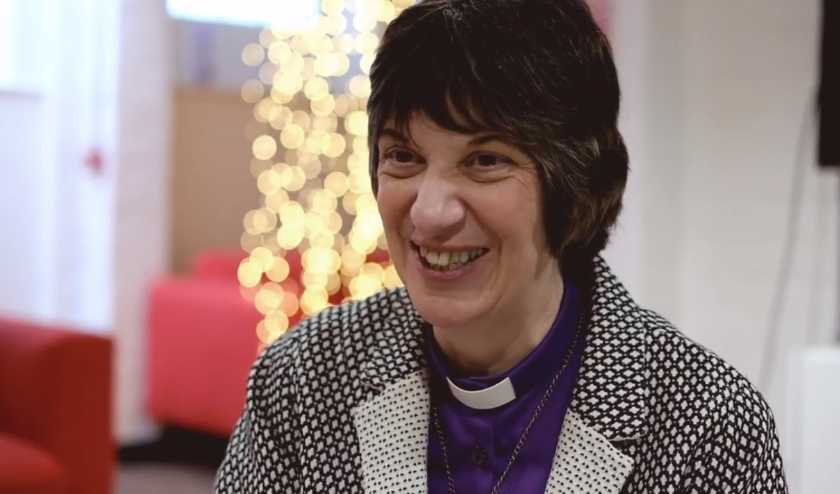Church of England should avoid only calling God 'he', Bishop says
Olivia Rudgard,
Social and Religious Affairs Correspondent
The
Church of England should avoid only calling God "he", a bishop has said,
as a survey found that young Christians think God is male.
Research by YouGov found that almost half of 18-24 year-old Christians believed God to be male, with just one in three over-65s believing the same.

The Rt Revd Rachel Treweek, bishop of Gloucester, the Church of England's first female diocesan bishop, said: "I don't want young girls or young boys to hear us constantly refer to God as he," adding that it was important to be "mindful of our language".
She raised concerns that non-Christians could feel alienated from the Church if its public pronouncements used solely male language to describe God.
"For me particularly in a bigger context, in all things, whether it's that you go to a website and you see pictures of all white people, or whether you go to a website and see the use of 'he' when we could use 'god', all of those things are giving subconscious messages to people, so I am very hot about saying can we always look at what we are communicating," she said.
The Rt Revd Dr Jo Bailey Wells, Bishop of Dorking, said the tendency to use male language was a "growing problem" as language use in general became more gender balanced.
"When I lead prayers or preach, I try to get around the problem by using both male and female imagery, and also by avoiding the need to say ‘his’ or ‘him’ too often," she said, adding that she doesn't "avoid male language altogether".
Clergy echoed the concerns, with the Revd Sally Hitchener, Anglican chaplain at Brunel University, arguing that it is "heretical" to say God is only male. She said there was a movement across the national church with events organised to "emphasise the feminine nature of God".
"No academic theologian in the UK would objectively say that God is male, and yet that is the common parlance in a lot of the church and definitely the message that is coming across in lots of the media communications that we're sending out there," she said.
Theologian and member of the Archbishops' Council the Revd Dr Ian Paul said that he believed the figures stemmed partly from a culture where "sex identity is ever present".
"I think it makes it increasingly hard for young people to think of personal being without thinking of sex identity—and so if God is the ultimate ‘person’ then God must be sexed - i.e. male or female," he said.
"This view contradicts orthodox Christian teaching—but many young people don’t have enough contact with the church for actual Christian teaching to counter the thinking they pick up from culture."
Research by YouGov found that almost half of 18-24 year-old Christians believed God to be male, with just one in three over-65s believing the same.

The Rt Revd Rachel Treweek, bishop of Gloucester, the Church of England's first female diocesan bishop, said: "I don't want young girls or young boys to hear us constantly refer to God as he," adding that it was important to be "mindful of our language".
She raised concerns that non-Christians could feel alienated from the Church if its public pronouncements used solely male language to describe God.
"For me particularly in a bigger context, in all things, whether it's that you go to a website and you see pictures of all white people, or whether you go to a website and see the use of 'he' when we could use 'god', all of those things are giving subconscious messages to people, so I am very hot about saying can we always look at what we are communicating," she said.
The Rt Revd Dr Jo Bailey Wells, Bishop of Dorking, said the tendency to use male language was a "growing problem" as language use in general became more gender balanced.
"When I lead prayers or preach, I try to get around the problem by using both male and female imagery, and also by avoiding the need to say ‘his’ or ‘him’ too often," she said, adding that she doesn't "avoid male language altogether".
Clergy echoed the concerns, with the Revd Sally Hitchener, Anglican chaplain at Brunel University, arguing that it is "heretical" to say God is only male. She said there was a movement across the national church with events organised to "emphasise the feminine nature of God".
"No academic theologian in the UK would objectively say that God is male, and yet that is the common parlance in a lot of the church and definitely the message that is coming across in lots of the media communications that we're sending out there," she said.
Theologian and member of the Archbishops' Council the Revd Dr Ian Paul said that he believed the figures stemmed partly from a culture where "sex identity is ever present".
"I think it makes it increasingly hard for young people to think of personal being without thinking of sex identity—and so if God is the ultimate ‘person’ then God must be sexed - i.e. male or female," he said.
"This view contradicts orthodox Christian teaching—but many young people don’t have enough contact with the church for actual Christian teaching to counter the thinking they pick up from culture."
